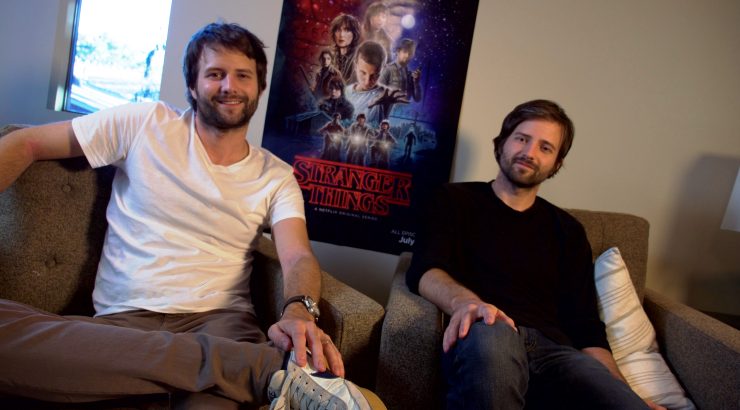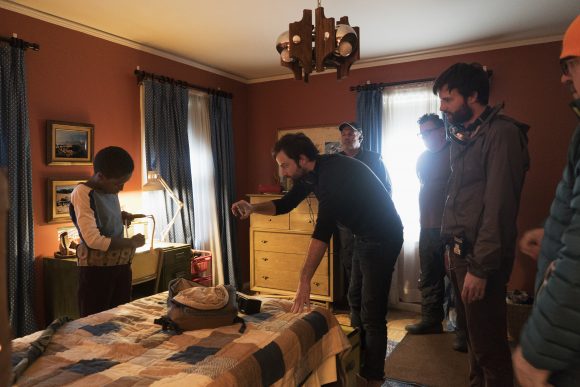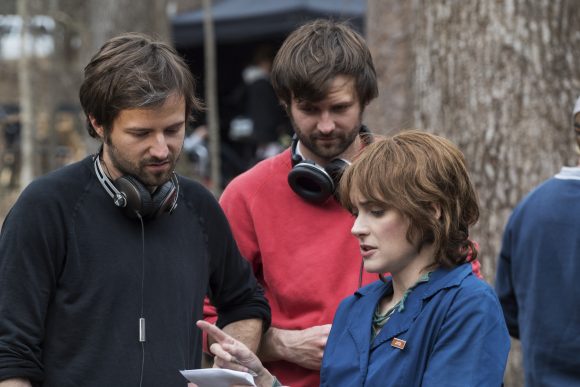
Matt and Ross Duffer Helm Break-Out Netflix Hit
January 19, 2017
Ordinary people facing extraordinary challenges and doing extraordinary things is a central theme of the hit Netflix series, Stranger Things, created by Chapman alumni Matt and Ross Duffer ’07. Facing the unknown, the characters work together, creatively solving problems as they arise, to reach their goals.
That theme also describes the careers of the Duffer Brothers, as they are known in the industry, who, at age 32, have seen their show create a firestorm of national media attention and Internet excitement, from the New York Times to Rotten Tomatoes. With just one feature film under their belts, the brothers have reached a level of success that perhaps they could only dream about in film school, overcoming the extraordinary hurdles for new young writer/directors in the highly competitive entertainment business.
Over dinner on campus a little over a year ago—just a month after Netflix announced its order for the new series, originally titled Montauk—Matt and Ross talked about their dreams and the steps they took to achieve extraordinary things.
For the Duffers, writing was the way in, although the path they took often included two steps forward and one step back.
“The best way to break into the business,” says Ross, “is to create something people want. “Our dream scenario is to be handed a script that’s great.” “But,” Matt adds, “with a great script, there are 20 great directors ready to do it.”
They first caught industry attention for their thesis film Eater, which was screened as part of Dodge College’s First Cut in 2007. After the screening, Tony Sella, then Chief Creative Officer for 20th Century Fox, ran up to them and eventually set up a meeting for them at Fox Atomic, its genre production label. “You get beat up so much, that was a big moment of validation,” Matt remembers. Yet nothing ultimately happened.

Stranger Things
Later, they wrote the spec script Hidden, “out of desperation that in a month we’d have to go to work at Starbucks,” Ross says. The script sparked a bidding war and eventually landed at Warner Bros. in 2011 with the Duffers attached to direct. Starring True Blood’s Alexander Skarsgard, principle photography began in 2012, but the completed film did not see the light of day until 2015, and then only on video on demand.
After Hidden, “we got offered tiny little horror movies we weren’t interested in,” says Ross. “We wanted to write something we wanted to do.”
Yet the Hidden script opened the door to a new opportunity: an offer to write some episodes of M. Night Shyamalan’s series Wayward Pines, which they did staying at Shyamalan’s Pennsylvania compound for seven months. Shyamalan became a mentor and, although they’d never done TV, as Ross told Rolling Stone, “That became our training ground. By the time we came out of that show, we were like, ‘OK, we know how to put together a show.’” And the result was Stranger Things.
The Duffers are brutally honest about the challenges and the opportunities of both the writing process and the business today.
“Ninety-nine percent of what we do is just terrible,” Ross says, “and we throw it out.” “Even Spielberg has bad ideas,” Matt adds. “But Spielberg has tons of ideas,” Ross says, and “maybe one out of 10 or out of 20 is a gem.”
The brothers encourage young writers to just write and not worry about making a script perfect. “Just write ‘til it works,” says Matt. “Don’t just go on Final Draft and start writing,” says Ross. “Plan it. The hidden outline is the movie; dialogue is just a formality. It’s easier to see the big picture when you’re zoomed back out to see the big beats.”
Indeed, only one script was written when Stranger Things began production, yet the story concept was so clear that Netflix bought it within 24 hours of hearing their pitch.
The brothers are particularly enthusiastic about what’s happening in television today. “TV now is more novelistic,” says Ross. “It allows you to ask, ‘how many hours do we need to tell this story?’” As showrunners, writers/directors, and executive producers of Stranger Things, the brothers are very cognizant of the trust and the opportunity Netflix gave them. Not only were they able to decide how many episodes the story should take, but individual episodes even vary in length. As Ross told the New York Times, Netflix has had so much success with the likes of producer/director David Fincher (House of Cards) and writer/producer Jenji Kohan (Orange is the New Black), ”that they’re able to roll the dice on some younger voices.”
Finding and pursuing their vision—and working in an environment where it wasn’t homogenized by committees and studio notes—was a key ingredient in the success of Stranger Things. That, and an emphasis on character.

Stranger Things
“Marvel films are based on a corporate vision, not a director’s vision,” says Matt. “In TV, you can be more consistently surprised. With Marvel, there’s a predictable third act.” And so, predictably, the brothers advise aspiring filmmakers to stay away from “executives who are in it for the business and find those who are passionate about film,” says Matt. He also discourages writers from “looking at the market to figure out what you think the market wants. Ignore all the noise,” he says, “and write what you want. If you truly love something, someone else out there will love it too.”
Looking back at their days at Chapman, the brothers find that a well-run student crew is “95% like a real production.” “Film school was well worth it. We walked on set really prepared,” says Matt. “Film school is the easiest, fastest way to surround yourself with people who love film,” adds Ross.
The most valuable thing they learned at film school? “Just going out and doing it,” says Ross. Matt, not surprisingly agrees. “The experience of making Eater was invaluable.” As these two young filmmakers riding the crest of the wave of excitement have discovered, it’s not impossible for passion and commitment to following your dreams to lead to a deal at Netflix, or a being offered a feature to direct or finding yourself interviewed by Rolling Stone. Who knows? Stranger things have happened.
From the reviews:
While a Rotten Tomatoes score of nearly 5,000 ratings showing 96% of the audience liked the film and scored it 4.75 out of 5, perhaps the most important review of all, at least to the Duffers, came from just one fan—Stephen King. The brothers grew up devouring his novels and watching film adaptations. King tweeted: “Stranger Things is pure fun. A+. Don’t miss it. Winona Ryder shines.” Horror director Guillermo del Toro also chimed in on Twitter: “Stranger Things may be a lot of thngs (sic): King, Spielberg, 80’s, myself (Duffers pointed that to me) but what it is, above all, is good!!”
Rolling Stone: “Stranger Things has become a buzzed-about breakout hit.”
Newsweek: “On paper…Stranger Things was a risk. The fact that it, and the Duffers, have defied expectations, can perhaps be rooted back to just over a decade ago when Matt and Ross Duffer first began exhibiting the flashed of brilliance that have made them Netflix’s hottest new commodity.”
Variety: “Stranger Things is the kind of genre entertainment that doesn’t forget the second word of that phrase, but it is primarily interested in watching believably flawed people wrestle with the idea that some things are unknowable, and that having ‘answers’ doesn’t necessarily prevent the arrival of pain and confusion.”
The Wall Street Journal: “This show is a delight to watch, comforting and compelling and pitched in just the right tone…. these eight episodes are as assured, inventive, satisfying, and compulsively watchable as anything Netflix has produced to date. The show’s dexterous mixing of horror and heart is blissfully sincere and uncynical, sporting no pointy irony that might obnoxiously jolt us out of its beautifully rendered world.”
The New Yorker: “Stranger Things…has a rare respect for both adult grief and childhood suffering. It’s an original….this is astoundingly efficient storytelling, eight hours pass in a blink, with even minor characters getting sharp dialogue, dark humor or moments of pathos.”
On being co-directors:
Another mark of distinction for the Duffer Brothers is that they won approval from the DGA to be listed as co-directors, a credit rarely granted. The Duffers have recounted more than once the terrifying experience of being grilled in front of a panel of legendary directors as to how they truly share the job. As Ross tells the story, even the Duplass brothers (Mark and Jay) didn’t get DGA approval, having been asked what they would do if one got sick. The answer that they would go ahead with production was “the wrong answer,” Ross says. The Duffers’ answer demonstrated how completely they work as a team. If one of them got sick? “We’d shut down production.” As Matt added in an interview with the New York Times, “We’re pretty much dysfunctional apart.”
On the Duffers:
Ted Sarandos, Chief Content Officer, Netflix: Matt and Ross are young visionaries, with deep knowledge of the creative and business challenges are getting movies and TV shows made and I attribute much of that to their studies at Chapman.
Stranger Things producer Shawn Levy in an interview with Steve Weintraub on Collider.com remarks on how the Duffers pitched their idea with “genuine humility and complete self-assurance…actually seeking partnership and collaboration….They’re filmmakers,” he says. “They will go on to direct many, many movies.”
Eater:
Here is The Duffer Brother’s thesis film from Dodge College from 2006.
Eater – 2007 from Dodge College – Chapman U on Vimeo.
EDITOR’S NOTE: This article originally appeared in the Fall 2016 issue of In Production. Read other great articles, and catch up on older issues, by clicking here.

